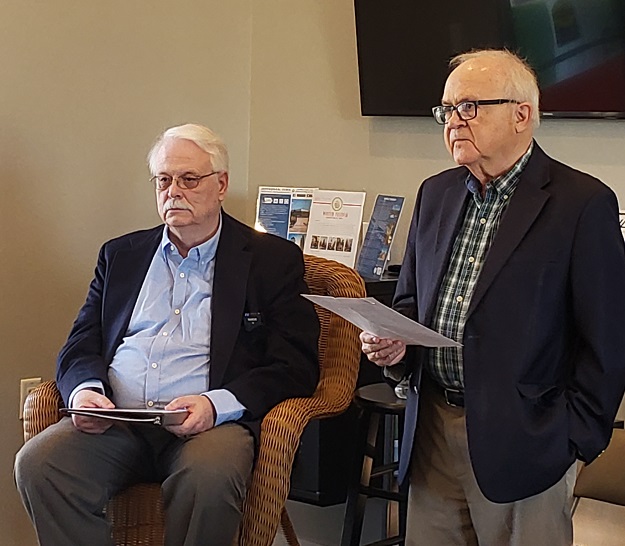About two dozen people attended the first program in a series entitled Understanding Democracy hosted by the Thomas Jefferson Gardens board at the Welcome Center Oct. 31. Randy Evans, director of the Iowa Freedom of Information Council spoke on the First Amendment and the Iowa Freedom of Information and public records acts.
Thomas Jefferson Gardens board member Janice Harbaugh introduced the series. Retired Jefferson Herald publisher Rick Morain introduced Evans. Morain is a member of the Iowa Public Information board.

Evans began a long career in journalism in his hometown of Bloomfield 55 years ago. He spent 40 years at the Des Moines Register.
According to Evans, “there is far too much derision, distrust and disrespect in our nation and in our state today. I think that is poisoning our democracy…. I worry what is going to happen to us as we increasingly seem to be unable to disagree with one another without being disrespectful. I worry a lot about where this lack of respect and anger is taking us.”
His mentor during his early years in Bloomfield was Gary Spurgeon, editor of the newspaper there, and he shared some of what he learned. “He (Spurgeon) underscored the importance of open and accessible government meetings and government records for the effective engagement of local citizens in their government. At its very heart, that is the lesson I heard loudly and clearly: Government does not belong to government employees and government officials. Government belongs to the public.”
The stated intent of the open meetings law is “to ensure that…the basis and rationale for government decisions as well as those decisions themselves are easily accessible to people. Ambiguity….should be resolved in favor of openness,” Evans explained.
The intent of the open records law is that “free and open examination of public records is generally in the public interest even though such examination may cause inconvenience or embarrassment to public officials and to others.”
“Some government officials understand this. Some government officials do their darnedest to pretend they’ve never seen those words,” Evans said.
He provided several examples of ways the open meetings and open records laws have been violated in recent years.
Evans said the Covid-19 pandemic has been both a curse and a blessing for civic affairs. He said in all his dealings with county boards, city councils and school boards across the state, “apathy typically is a bigger problem than government secrecy. Far too often the public pays too little attention to what their local government is doing until an issue blows up that grabs their attention.”
Covid-19 is an issue that grabbed attention.
“Covid has been a curse because meetings that used to be held in person moved to the virtual realm for close to a year. Virtual meetings are difficult for the public to ask questions at, to talk with government officials at, or to visit with other concerned citizens.”
A meeting brings together people who have interest in an issue. He said that it’s difficult to know who else is ‘attending’ a virtual meeting, and people can’t meet in the hallway to talk with after a virtual meeting.
He said virtual meetings can be easier to attend because persons don’t need to get a babysitter or drive 15-20 miles. They’re easier for senior citizens to ‘attend,’ and farmers can tune in to a meeting from the cab of their tractor or combine. The use of virtual meetings has been a blessing.
He called it “unfortunate” that some boards have discontinued virtual meetings with easing of pandemic-related restrictions on gathering. “The law does not require government boards to offer remote access to their meetings. I think governments that take that approach are not living up to the spirit of the law, which is basically that the public is entitled to see their government officials discuss and make decisions on the issues that affect the public,” he said.
He finished his prepared remarks with a quote from Thomas Jefferson.: “Whenever the people are well informed, they can be trusted with their own government.”
The next program in the Understanding Democracy series will be Sunday, Jan. 30. County attorney Thomas Laehn will speak on the Sixth Amendment. That amendment guarantees the right to trial by jury.
